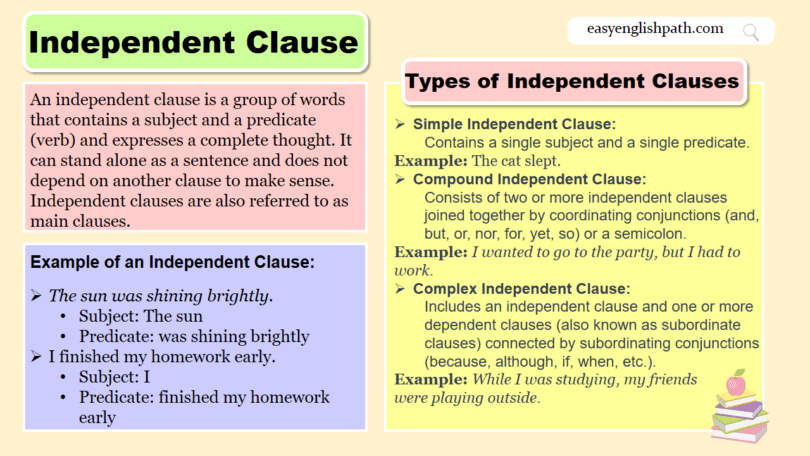An independent clause is the foundation of a complete sentence. It contains a subject and a verb and expresses a clear thought on its own. These clauses help us form simple sentences and can also be combined to create longer, more detailed ones. Understanding independent clauses is important because they make writing clear and easy to read.
What is an Independent Clause?
An independent clause is a group of words that has a subject and a verb and can stand alone as a complete sentence. It expresses a complete thought.
- She walked to the park.
- He likes to play basketball.
- The dog barked loudly.
- They went to the beach.
- I enjoy reading books.
Types of independent Clause:
There are three main types:
- Simple Independent Clause
- Compound Independent Clause
- Complex Independent Clause
1. Simple Independent Clause:
A simple Independent Clause is a group of words that has a subject and a verb and can stand alone as a complete sentence. It is used to expresses a complete thought.
Examples:
- She reads books in the morning.
- We play games in the ground.
- He runs fast in the ground.
- It rains often in the city.
2. Compound Independent Clause:
A compound independent clause is used when you have two or more complete thoughts that can stand alone as sentences, and you join them together using a coordinating conjunction like and, but, or or.
Examples:
- I ate dinner, and she watched a movie.
- She ran quickly, but he walked slowly.
- He read a book, and she painted a picture.
3. Complex Independent Clauses:
A compound independent clause joins two complete sentences using a comma and a coordinating conjunction (e.g., and, but, or, so). It combines simple sentences into a longer one.
Examples:
- Although it rained, we still went to the park.
- She studied hard, while her friends watched TV.
- Since the sun had set, we turned on the lights.

Independent Clause vs. Dependent Clause
| Feature | Independent Clause | Dependent Clause |
|---|---|---|
| Definition | A complete thought that can stand alone. | An incomplete thought that depends on an independent clause. |
| Grammatical Role | Forms a full sentence by itself. | Must be attached to an independent clause. |
| Conjunction Use | Can stand alone or be joined with another clause using coordinating conjunctions (and, but, or). | Usually starts with subordinating conjunctions (because, although, when). |
| Example | She loves coffee. | Because she loves coffee. |
Examples of Independent Clauses
- She loves coffee and drinks it every morning.
- We watched a movie at the cinema last night.
- Ali plays football every weekend with his friends.
- The sun is shining brightly in the sky.
- I finished my homework before dinner.
- They traveled to Dubai for their vacation.
- Sara baked a delicious cake for her sister’s birthday.
- He bought a new phone because his old one stopped working.
- The teacher explained the lesson in great detail.
- We visited the museum to learn about history.
Frequently Asked Questions
Q: What is an independent clause?
Ans: An independent clause is a group of words that forms a complete sentence and can stand alone.
Q: Can an independent clause be a full sentence?
Ans: Yes, an independent clause is a complete sentence on its own.
Q: How do I recognize an independent clause?
Ans: It has a subject and a verb and expresses a complete thought.
Q: Can two independent clauses be combined?
Ans: Yes, they can be joined using a coordinating conjunction (and, but, or) or a semicolon (;).
Q: What is the difference between an independent and a dependent clause?
Ans: An independent clause makes sense on its own, while a dependent clause needs an independent clause to be complete.
You May Also Like





